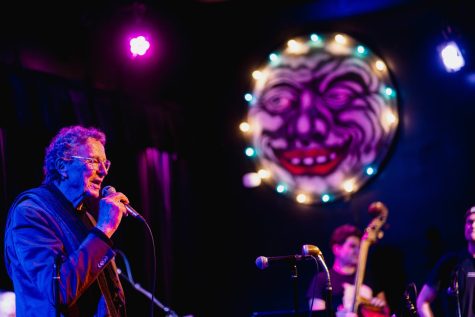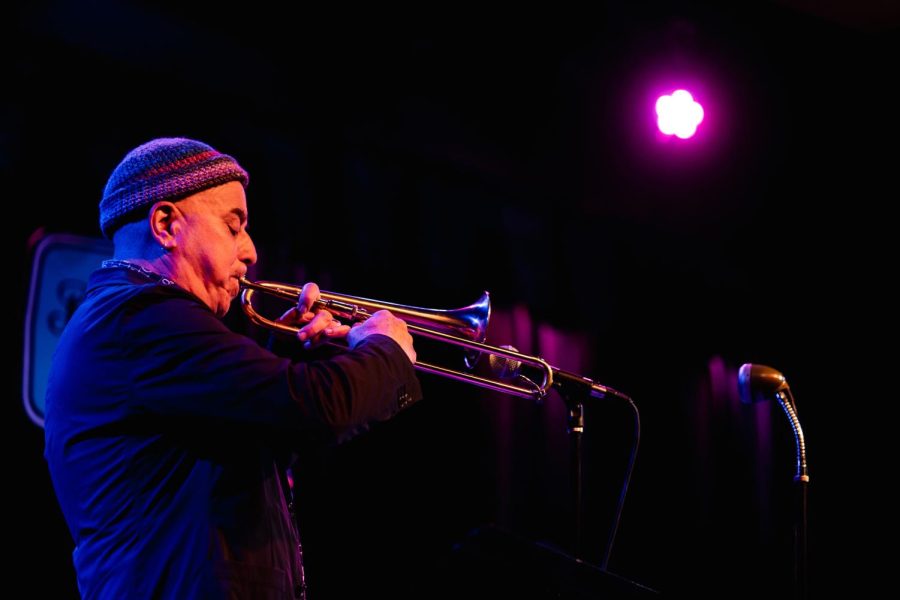Ya Like Jazz?: Jazz in Seattle
Sex Bomb performs at an event put on by Earshot Jazz at the Royal Room.
When you think of jazz, your mind probably doesn’t immediately go to Seattle. So, it might be surprising to find out that Seattle has an active and thriving jazz scene.
According to Max Holmberg, a local jazz musician, jazz garners a lot of support in the Emerald City. He feels that there are a lot of venues, organizations and audiences that support music in Seattle.
“It’s about as good as you could ask for in the U.S.,” Holmberg said.
Earshot Jazz is one of these organizations. The Executive Director of Earshot, John Gilbreath, works to make sure the genre is kept alive in Seattle and the rest of the world. Gilbreath believes that Seattle is a great place for the jazz scene to thrive, and wants to make sure that it continues to thrive.
“There’s this kind of value system that exists here for jazz,” Gilbreath said. “It’s an art form that’s always changing shape.”
Seattle jazz education programs are a major reason that Gilbreath believes the genre continues to be so prominent. Many high schools in the area have award-winning jazz programs, which Gilbreath says helps create new audiences for the art form. In his eyes, even if these people do not grow up to be musicians, they will still seek out jazz as listeners.
“If there’s more people becoming active and interested in the art form, then that’s going to renew and enrich the supply and demand,” Gilbreath said.
Seattle JazzED is another resource for jazz education. Their mission is to provide music education to any student in Seattle who wants it at little to no charge. Angie Jenkins, the director of Learning Assistance Programs at Seattle University is a board member at JazzED. She joined the organization after her son attended one of their summer programs. Jenkins was impressed with how JazzED focused social justice and accessibility in their mission, and jumped at the chance to be involved.

“Music generally is very expensive to participate in, so [JazzED] is trying to remove as many barriers as possible,” Jenkins said.
One way that JazzED does this is by holding programs in communities where access may be limited, so they can make sure that the people who need their programs can get them. JazzED also furthers their social justice mission by making sure to teach the Black history of jazz in their lessons. According to Jenkins, it is important to the organization to make sure that they teach about who originated jazz and why, something Gilbreath tries to center in his work.
“I believe to my core that jazz belongs to Black America, and it’s a cultural treasure of Black America,” Gilbreath said.
Outside of educational resources, there are different ways to play and listen to jazz in Seattle including The Beaver Sessions, which was started by Holmberg back in 2014. Holmberg expressed that the jazz scene in Seattle is very “avant garde,” and he thought that there was a space for a session more focused on playing swinging jazz. Jazz sessions are a place to hang out and play music, and much less strict than performances, which is one of Holmberg’s favorite parts about them.
“It’s kind of like industry night for musicians,” Holmberg said. “[The best part] is seeing community come together and getting to hear people play.
In a city with a rich history with music, it is no wonder that Seattle is able to support a vibrant jazz community. Gilbreath believes there is a large appreciation for arts in the city. He thinks that sinceSeattleites value arts so heavily, artists are able to thrive, which supports the local jazz scene and leads to a better community.
“When artists thrive, we all thrive,” Gilbreath said. “The more we can do locally for our own community, that’s where our work is.”
For people looking to get more involved in the local jazz scene as a listener or a musician, Holmberg recommends finding a session to attend.
“If you want to meet musicians, that’s where they have time to talk to you especially,” Holmberg said. “At a session people are there to hang out.”
There are plenty of opportunities to enjoy Seattle’s jazz scene, so next time you find yourself turning on some jazz music to study, consider going out to find that music instead.


